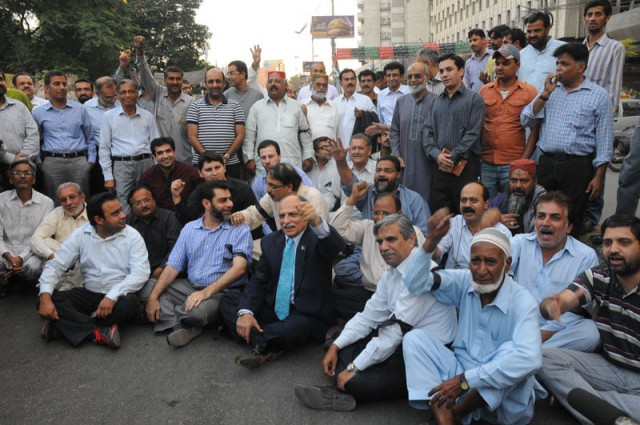Businessmen call for calm amid political strife
Traders have mixed emotions about the ruling party’s achievements

As government and opposition supporters rally against each other, economists and businessmen have warned against getting carried away by popular sentiments at a time when economy should be the first priority for everyone.
Issues like electricity supply, power generation mix, fuel costs, cutting reliance on furnace oil, finding a way to deal with high imported cost of gas, trade liberalisation policies and cross subsidies have been pushed back, increasing anxiety of entrepreneurs.
Even the businessmen and traders who openly supported the Pakistan Muslim League Nawaz (PML-N) seem confused on who to support considering the particular set of problems faced by the country.
“Big business groups or traders are almost always with the government,” said Federation of Pakistan Chambers of Commerce and Industry (FPCCI) President Zakaria Usman.
“They don’t want to be seen close to any particular party. That is one reason you are witnessing silence on part of the business community.”
FPCCI, the apex body of all the trade associations in the country, believes that the democratic process should continue. Usman added, “If anyone disturbs it, we will be going back to how things were for so long in this country.”
Right now, everyone’s focus should be on tackling the law and order issues and the problem of non-availability of utilities like power, he said.
“I think the government is moving on both these fronts. Projects like coal-fired power plants planned at Gadani will help ease our energy woes in coming years,” said the chief.
Hint of opposition from traders
A Lahore-based Chinioti businessman said that a large section of the financially powerful community, which has historically supported Sharif, have become disillusioned about the government’s approach in recent months.
“None of the changes that were promised before elections have materialised,” he said. “The inconsiderate decision to block roads in Punjab made our lives miserable. Many companies faced delays in meeting their export orders.”
Meanwhile, economist Asad Sayeed says that financial issues have become quite relevant in driving public sentiments. “People now hold the parties accountable for their performance as we saw in case of Pakistan People’s Party,” said Sayeed.
Urban traders backed PML-N mainly because of the party’s election campaign, which focused on finding quick ways to fix electricity supply issues, he said.
“The government has taken too long to move on key issues despite the fact PML-N has ruled two times before. They should have anticipated all the problems and moved quickly. That didn’t happen,” he said.
On the initiative taken recently to start the privatisation process of distribution companies, Sayeed said that regardless of its usefulness, it is the prerogative of the government to pursue the policy, which they have taken too long to initiate.
But it’s not like those protesting have a solution, he said. “There is no magic wand to resolve economic issues as they are all deep rooted and structural in nature and the populists have not demonstrated any plan to rectify it.”
The much cherished foreign direct investment (FDI) comes to Pakistan at a cost. Because of the red tape, protectionist policies, poor law and order, and unskilled workforce, the FDI has followed the sectors where government offers lucrative returns like thermal power plants.
None of the political parties seem to have prepared any comprehensive agenda that deals with issues like long-term inflation expectations, debt-to-GDP ratio, finding competitive edge for Pakistani exports and fuel price rationalisation.
OJ Engineering Chairman Feroz Khan said the biggest challenge facing the country was terrorism. “Every politician must support army’s crackdown against terrorism as the first priority, then take steps to meet the energy shortage and find ways to raise the tax-to-GDP ratio.”
Whatever the outcome of recent confrontation, the fact that the private sector credit has picked up over the past year indicates that businesses have reposed trust in the current administration.
Published in The Express Tribune, August 12th, 2014.
Like Business on Facebook, follow @TribuneBiz on Twitter to stay informed and join in the conversation.



















COMMENTS
Comments are moderated and generally will be posted if they are on-topic and not abusive.
For more information, please see our Comments FAQ